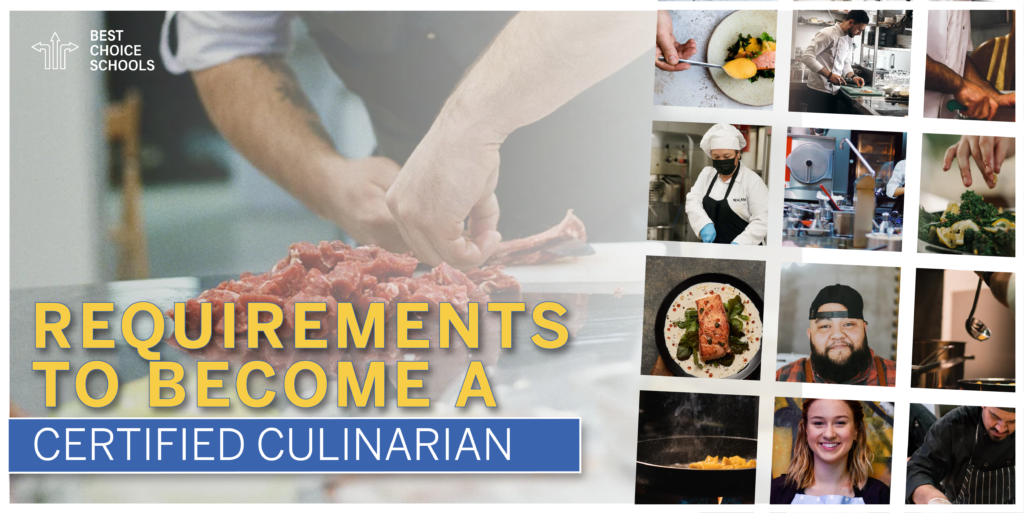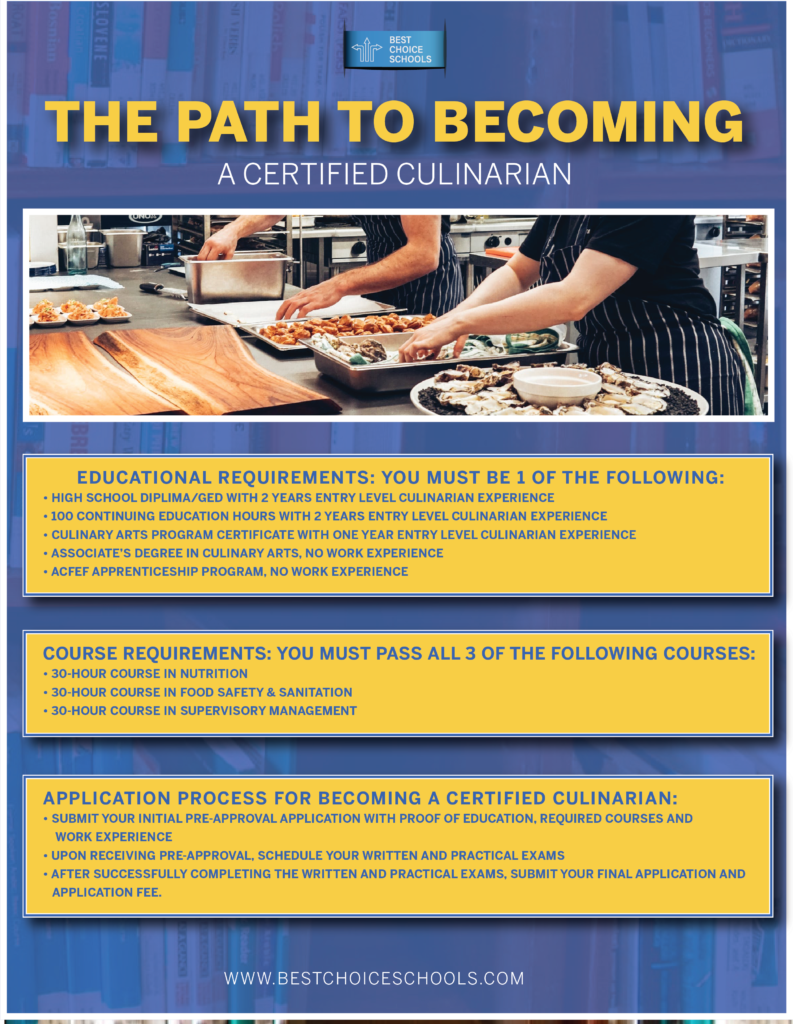
If you want to become a certified culinarian, there’s pretty much only one route you can take, and this is through the American Culinary Foundation or the ACF. You can’t just wake up one day and decide to take the Certified Culinarian exam, however. There are many different experience and education requirements that you’ll need before you can even qualify to take this exam.
Anyone who wants to qualify for the Certified Culinarian exam through the American Culinary Federation (ACF) must meet the essential employment and education qualifications. They must also submit documentation that proves they have taken three specific culinary-related classes. Once this is completed, candidates can take the written and practical exams. In order to become a Certified Culinarian and pass your exam, you will need to pay close attention to the requirements we discuss below.
In this post, we will also be discussing the kind of jobs you can get as a Certified Culinarian to help you determine whether or not you want to pursue this kind of career path. We’ll also break down how much certified culinarians get paid, which is a deciding factor for many people when pondering their future in the culinary field. Overall, there is a lot to think about when pursuing any culinary certification, so be sure to read thoroughly if you’re thinking about it for yourself.
Related article: 50 Best Culinary Schools in the US

What Is a Certified Culinarian?
A certified culinarian—according to the ACF—is a culinary professional within a commercial foodservice operation or one who has graduated from an accredited culinary program. If you’ve earned a certification as a Culinarian, you have demonstrated incredible culinary knowledge and skill, and you have a solid understanding of food preparation and food safety. In addition, as a Certified Culinarian, you know how to cook and prepare food, manage a restaurant or non-eatery kitchen, and properly clean a kitchen and food utensils.
A Certified Culinarian (CC) is the lowest level certification available through the ACF and is the most entry-level achievement available to members of the federation. This does not mean that becoming a CC is an easy task, however. Instead, it’s a real achievement since the certification requires quite a bit of experience and education. While you do not have to start out by pursuing a CC certification, it is the natural first step in the ACF for many people.
See also: 5 Functions of the American Culinary Federation
What Can You Do With a Culinarian Certification?
A CC can work in a variety of different commercial foodservice operations. These operations could include restaurants or eateries, but they could also include non-eatery kitchens like schools, private chef kitchens, or even sorority or fraternity houses. For example, a CC could work specifically as a cook in one of these kitchens, but they might also work exclusively in food preparation or cleaning practices.
Thus, there are a wide variety of entry-level and higher-level positions you could attain with a culinarian certification. However, you will usually need to have some entry-level work experience if you do not have a culinary degree. As a culinarian, some of the duties you might be responsible for include:
- Cleaning and sanitizing your work and food preparation stations
- Weighing and measuring ingredients
- Preparing and chopping fruits and vegetables for cooking
- Mixing ingredients for salads and other dishes
- Storing ingredients in air-tight and cold containers to prevent spoiling
- Warming food for immediate serving.
How Much Does a Certified Culinarian Get Paid?
According to many salary estimates, the average salary for a certified culinarian is around $50,000 a year. This number will obviously vary greatly depending on the kind of position you take once you’re certified. If you become a head chef, executive chef, or even a sous chef later on down the road, you could make a salary up to $70,000 and beyond. However, if you take a more entry-level position like a dishwasher or kitchen hand preparing food, you will make significantly less money. The kind of salary you make also depends on the type of work environment you’re in: if you are employed in a public school versus a five-star restaurant, the pay grade will be a lot different.
Another variable when it comes to the pay scale of a CC is location. Businesses located in metropolitan areas and certain famous neighborhoods or regions may offer more in the way of pay than those that are less well-known.
What’s the Difference Between a Culinarian and a Chef?
A culinarian is, at its most basic understanding, a simplified and under-experienced version of a chef. Most people agree that a chef differs from a cook in terms of experience, education, place of work, and apprenticeship. However, this is basically where a culinarian differs from a chef as well.
A culinarian will not have nearly as many years of experience as a professional chef, and they might work in a non-restaurant kitchen such as a school. On the other hand, a chef will likely be the head of operations at a fancier restaurant or hotel kitchen, and it is unlikely that you would see them cooking in a non-eatery operation.
If you aspire to become a chef one day, however, you could very well begin with getting a professional culinary certification. Getting a CC certification is an incredible way to advance your career in the foodservice industry, especially if you one day aim to become a sous chef or executive chef.
You may also like: What is the Difference Between a Certified Cook and a Chef?
The Basic Requirements
The minimum work experience requirement for CC certification is at least two years as an entry-level culinarian. This employment experience must be within the previous ten years. Individuals who possess a one-year culinary arts certificate or diploma only need to have one year of entry-level work experience.
Individuals who have a two-year associate’s degree in the culinary arts are not required to have any job experience. The basic educational requirement is a GED or high school diploma. Those who do not have one can qualify by showing they have earned at least 100 hours of continuing education credits. The three mandatory culinary classes can count towards the 100 credit hour requirement.
All CC exam candidates must provide transcripts or academic documentation that shows they have completed three specific classes: nutrition, supervisory management, and food safety and sanitation. Each of the classes must be a 30-hour course that the candidate completed within the previous five years. These three courses are available through the American Culinary Federation and approved academic institutions.
The Path To Becoming a Certified Culinarian

The Three Required Classes
Nutrition
A basic nutrition introduction is vital for many reasons:
- CCs need to have a solid understanding of the nutritional properties of food and how they are transformed through cooking and preparation.
- A nutrition course will cover valuable and interesting information that is essential to a CCs professional success.
- Aspiring chefs who want to make a positive difference in their client’s lives will usually incorporate nutritional planning into their work.
The class will cover dieting, food properties, applicable technology, and nutrition standards and guidelines.
Food Safety
A food safety and sanitation class is the most important one for CCs to pass. The information in this class is critically important to the restaurant industry and its customers.
Approved programs will use the industry-standard ServSafe Coursebook that presents the preventative measures and best practices that keep patrons healthy and prevent illness. In addition, students learn about the flow of food, safe food handling, food-borne diseases, and maintaining sanitary workspaces, equipment, and facilities.
Supervisory Management
A supervisory management class will teach students how to direct food service workers while planning and controlling every aspect of the work process. In addition, this class will train team leaders and supervisors in the foodservice industry techniques for effective planning and the importance of problem-solving tools.
Written Exam
Those who meet these qualifications can take the written exam that consists of 100 multiple choice questions that must be completed in one hour. A score of 70 percent is required to pass. Next, candidates must take a practical skill proficiency test within two and half hours at a test site approved by the ACF. Those who earn a score of 75 percent pass and become an official certified culinarian.
Related Resource: Top 10 Best Culinary Schools in Pennsylvania
How Much Does It Cost To Become Certified as a Culinarian?
The amount of money that it will cost you to become a CC will depend on whether or not you are a member of the ACF. First, it’s essential to consider the cost of the actual exam that the ACF administers. If you are a member of the federation, it will only cost you $220 to take this exam if you only need to take it once, and if you pass the first time.
If you are not a member of the ACF, the exam will cost you $490. This is one of the many reasons it is so beneficial to become a member of the ACF, especially if you aim to become a culinarian, cook, or professional chef.
If you want to become a CC, you will also need to think about the kind of coursework you’ll need to complete to qualify to take the exam. Taking college-level courses can become incredibly expensive, but the cost can go down if you have more work experience than coursework.
For example, if you only have a high school diploma or GED, but you have two years of culinary work experience, you won’t need to pursue any additional coursework. On the flip side, if you’ve completed something like the ACFEF Apprenticeship Program, you don’t need any further work experience.
See also: What Should I Look for in a Culinary School?
How Long Does It Take To Become a Certified Culinarian?
Like we mentioned above, the amount of time it takes to become a CC depends on the kind of coursework you’ve already completed, the coursework you intend to complete, and how long it takes you to prepare for and pass the exam.
Regardless of your previous experience, you will need to complete the three required courses for the exam (30-hour course in Nutrition, 30-hour course in Food Safety & Sanitation, and 30-hour course in Supervisory Management). These courses in total will take you 90 hours to complete on their own. In addition, if you completed these courses more than five years ago, you will need to take an eight-hour refresher in each of them.
In addition to these courses, you’ll need to spend around two years pursuing either an associate’s culinary degree or getting about two years of work experience. By the time you actually decide to pursue a culinarian certification, you may have already obtained this experience or a degree. However, if you haven’t, you will need to spend time doing that before you can become approved to take the CC exam.
Related: 5 Common Courses in Culinary School

Is Getting Certified as a Culinarian Worth It?
To determine whether or not becoming a certified culinarian is right for you, you will need to weigh all of your options. The first thing you should consider when deciding whether or not to take the CC exam is whether you can fulfill all of the requirements needed to qualify for this exam.
As mentioned before, these requirements can include:
- Getting an associate’s or bachelor’s degree in culinary arts
- Pursuing two or more years of entry-level culinary work experience
- Taking college-level courses in topics like food preparation and sanitation
- Studying for an incredibly challenging exam
You’ll also need to decide whether you can afford to become a CC! Besides taking the actual exam, which can cost up to $500 (and that’s only if you take it just one time), you’ll need to also invest in the coursework and time needed to fulfill the requirements. If you are serious about becoming a CC, you should also look into possible scholarships for culinary students.
Overall, many culinary professionals find a lot of success in becoming a CC. Whether you want this certification to be your first career move or your final one, becoming a certified culinarian will undoubtedly lead you to new experiences in your foodservice career.
While the path to becoming a CC is a relatively rigid one by some standards, your options once you complete this certification are extensive. Not only will you become much more
knowledgeable about the foodservice world by becoming a CC, but you will also open yourself up to more professional, well-paying, and higher-reaching job opportunities with this prestigious certificate.
Related Articles:
5 Common Courses in Culinary School


